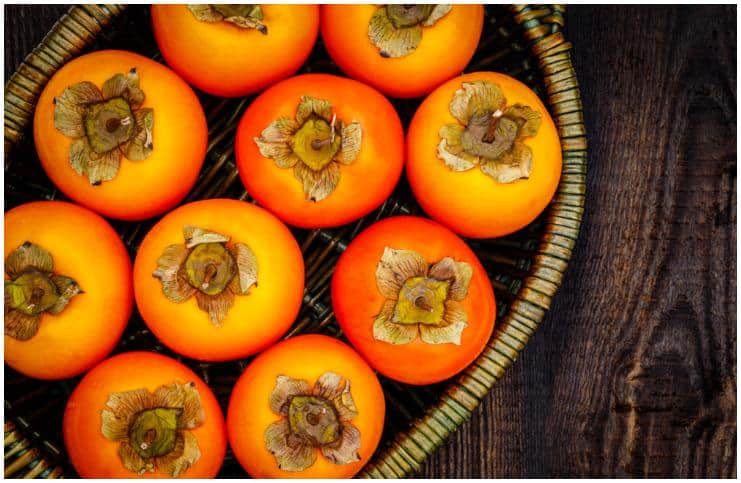Persimmon Side Effects, Nutrition Facts, Health Benefits:
Persimmon, botanical name Diospyros kaki L. (food of the gods), is an orange or red-brown exotic fruit native to China.
There are more than 400 species of fruit that are cultivated in warm regions of the world, including Turkey, Japan, China, Korea, Brazil, and Italy. There are two types of persimmons sold on the markets throughout Europe and North America:
- Fuyu (non-astringent or also known as Sharon fruit, if they’re grown in Israel) – this type looks like a squashed tomato but is sweeter, smaller, and edible while still firm.
- Hachiya (astringent) – this type makes up approximately 90% of the available fruit. It is identifiable by its acorn-shaped, with a pointy bottom, and it is tart until it becomes soft ripe.
This fruit begins appearing in markets in late September and is available through December.
Nutritional Facts
The ripe fruit has a low-calorie content (only 70 calories), soluble and insoluble fiber, and is high in glucose.
Furthermore, minerals include – potassium, copper, sodium, phosphorus, magnesium, and iron, vitamins include vitamin B6, B9 (also known as folate – it helps the body to produce healthy red blood cells and prevents anemia), C, E, and K.
Additionally, the fruit contains all kinds of flavonoids, phytonutrients, and antioxidants (such as lycopene, beta-carotene, lutein, zeaxanthin, cryptoxanthin), as well as betulinic acid, which has antiretroviral, anticancer, antimalarial, and anti-inflammatory properties.
Health Benefits of Persimmon
Improves the energy level
This fruit provides natural sugars that are quickly absorbed into the bloodstream for an instant boost of energy.
The energy that is harvested from this fruit by our bodies is all-natural, as opposed to synthesized supplements and energy drinks, meaning they will provide real energy, and will not lead to an inevitable crash after eating refined sugars.
Good for cardiovascular health
The potassium found in this fruit reduces the risk of stroke, and adding the fruit to one’s diet can lower low-density lipoprotein (bad) cholesterol.
Good for your eyes
Carotenoids play an important role in protecting the integrity of vision and ocular health, especially zeaxanthin and lutein.
A 2011 study published in the November 2011 Journal of Optometry established that there is an improvement in the vision of elderly people through nutritional supplementation of these substances.
Constipation relief home remedy
Constipation is extremely common, afflicting 42 million individuals in the U.S. The average American gets just 15 grams of dietary fiber per day, though nutritionists recommend at least 31.5 grams.
Additionally, most of us don’t drink enough water, either, which also contributes to constipation. 1 average fruit contains 135 grams of water and 6 grams of fiber.
Helps you lose weight
Due to its high fiber content, it promotes weight loss. Fiber is the part of plant foods that is not digested by the small intestine.
A study concluded that adults who added more dietary fiber to their diets (without changing anything else) lost almost as much weight as people who followed the complex AHA – American Heart Association diet.
Effective against cancer
An anti-cancer diet is a crucial strategy you can use to reduce your risk of cancer. This fruit contains powerful antioxidants, that can halt a naturally occurring process in the body that creates free radicals that can damage your cells. Moreover, other phytonutrients in these fruits may help keep cancer cells from spreading or growing.
Fights inflammation
Inflammation is the process by which the immune system of the body reacts to a specific situation, namely against it.
This fruit is loaded with vitamin A (1 fruit has a daily recommended value of 91 percent), which protects the body against free radicals and reduces the levels of inflammation correlated with a lower risk for neurodegenerative diseases like Parkinson’s disease and Alzheimer’s disease.
Brightens skin tone
A regular nutrition that is focused on fresh fruits and vegetables is a fundamental building block of healthy skin due to their high levels of antioxidants, which according to some studies, correlates to fewer fine lines and furrows.
More importantly, vitamin C is important to the growth and formation of skin and muscle tissue as well as to building collagen, a protein found in connective tissues of the body.
Precautions and possible side effects of persimmon leaves
Allergic reactions to the fruit are very rare. Ripe Diospyros kaki L. is safe for human consumption, including for pregnant women and children.
Avoid eating the unripe fruit especially as it contains a high level of tannins (particularly in the skin) and some individuals may be allergic to the compound. Also, tannins may interfere with the absorption of nonheme iron, that is the iron found in plant-based foods.
However, any kind of processing – drying, baking, or freezing relieves the tannin levels and brings out the sweetness.
Storing
The astringent varieties (Hachiya) may be stored at room temperature 68 °F (20 °C ) for up to 3 weeks, where they will continue to ripen. Non-astringent varieties (Fuyu) have a short shelf span and can be stored for only a few days at room temperature. Dried persimmons are stored in a dry, cool place.
How to eat
This fruit can be used to make desserts, cakes, pies, ice cream, and jelly as well but you’ll get the full nutritional benefits (and tastes best) if you eat it raw.
READ THIS NEXT:
How to Pick a Ripe Watermelon at the Grocery Store
Silica Supplements Side Effects
References http://www.medicalnewstoday.com/articles/289551.php https://www.ncbi.nlm.nih.gov/pmc/articles/PMC4817420/ http://www.excli.de/vol14/Naz_04052015_proof.pdf http://www.prnewswire.com/news-releases/study-shows-zeaxanthin-improves-vision-in-elderly






Found the information very helpful. I am a senior